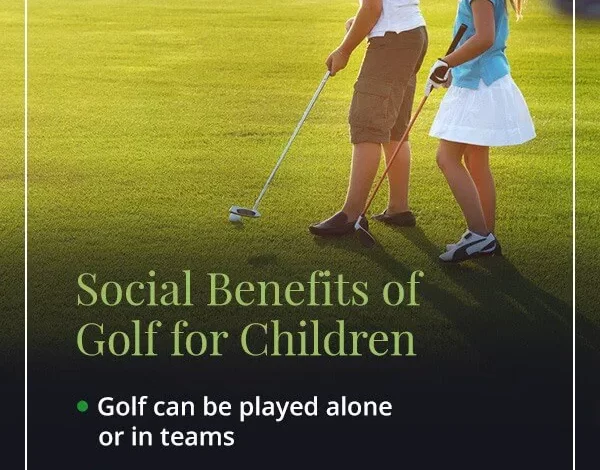REASONS CHILDREN SHOULD PLAY PUTT GOLF

Getting your kids involved in Putt golf from an early age is one of the best things you can do to help them succeed in all aspects of life. Golf is a great way for kids to get fit and play a sport they love in a safe environment. And the benefits aren’t just physical. It helps in mental and emotional development as well as social and emotional skills that last a lifetime. One of the things we love about golf is that anyone can play it. Young or old, big or small, you can play golf.Plus, it’s a fun activity that the whole family can enjoy together.
Social benefits of golf for kids
Putt Golf is also a great place for children to learn important social skills. Learning to be comfortable being alone and working on the skills needed to get along and build relationships with others all come from playing golf. Some of our favorite social benefits of are:
Putt Golf can be played alone or in teams
Putt Golf is a versatile sport that can be played in many different ways. Putt Golf Can Be Played Alone – Great for introverts to become more comfortable alone for mild concentration and social development. Golf can be played with partners or in small groups. You can also use it to build relationships and memories with friends and family.
Golf builds friendships
Children’s sports and clubs can help them make friends, but the nature of Putt Golf especially facilitates this aspect. Golfers feel sorry for each other when they see bad scores, encourage each other, and celebrate good results together. It’s a great activity for bonding, creating memories, and building lasting friendships. Children on golf teams often form close bonds and develop lifelong friendships.
Golf builds business skills
It may sound strange, especially when your kids are small and the business world seems far away. Also, many business-related jobs use golf as a means of meeting and connecting with customers and colleagues. Those who already know the game will step into the business world later, even if it’s years away.
Mental and Emotional Benefits of Golf for Children
There are many amazing benefits that golf also brings to children’s intellectual and emotional development. Golf is more than just a sport; it teaches important lifelong values that can help children at home, school, and beyond. Here are just a few of the mental and emotional developmental benefits that golf can offer.
Golf teaches responsibility and discipline
The game of golf has many rules, and the rules can be introduced slowly at a pace that suits children’s abilities. , Teach them to follow the rules in other areas of life, such as home and school. Children also learn to take responsibility for their gear and show up on time so they don’t miss it.
Golf teaches integrity
The nature of the game makes it easy for anyone to cheat by moving the ball or adjusting the score, but by playing right and doing the right thing, children will be able to show honesty and integrity. Quickly learn the value of it’s a lifelong important skill.
Golf promotes quiet time
Children who are naturally introverted or quiet can really enjoy the tranquility of the game of golf and the nice change from other loud and rowdy sporting events. It can have meditative qualities because it waits quietly while one is playing. For an extroverted or talkative child, learning to be quiet and to appreciate silence is an important trait.
Golf develops emotional control
For some children, and for some adults, it can be difficult to control their moods after a bad shot or game and learn to act with self-control and maturity.
Golf teaches patience
Playing a game of golf is a great lesson in perseverance. Golf is not a fast-paced game where players have to wait patiently for their turn. Also, it may take a lot of time and practice to see a slight improvement in his level of skill or in his golf score. In fact, success in golf requires patience.
At what age is it appropriate to start Putt golf lessons?
With all these amazing benefits of playing golf, you may want your child to start playing golf as soon as possible. But what is the ideal age to start playing golf? There is no perfect age, but there are some things to consider. Etiquette, self-discipline, and most importantly maturity are some of the most important things a child needs to have before they are ready for the golf course. Every child matures and develops at a different rate, so some people are ready to start playing golf at an early age, while others may prefer to wait a while before trying the sport.
Be mindful of your child’s normal behavior and maturity and consider whether they are ready for the game. Because of the equipment used in the game, young children must be mature enough not to try to hit someone or something with a swinging golf club must be able to understand. By the time a child is ready for formal school (around age 5 or her 6), they should usually be ready to take golf lessons. But maturity in golf can come sooner or later, depending on how your child grows.
How do you play putt golf Terminology and other essentials to know
If your child is too young to start playing, start early to plant the seeds and maintain their curiosity and interest when the time comes. Show off a clip of your golf video or try out a toy version of the golf club set for kids to play at home. If you love the game and show enthusiasm, you’re sure to impress. Most importantly, enjoy the game yourself and let your child play without pressure.
How to encourage kids to play putt golf
If you love putt golf, you might want your kids to start playing the sport right away, but it’s important to wait until they’re really mature and ready to play golf. There are many things you can do to help. Let them explore the game on their own at first so they can ask questions and discover the game at their own pace. Don’t try to fix them or do it too early. Most importantly, enjoy it. Show enthusiasm and laugh at your mistakes. The fun atmosphere you create is contagious to your children.
Communicate with a young golfer on his level. Teach them how to play while you kneel, look them in the eye and talk quietly. Simplify terminology and use shapes. Sounds and humor to describe the gear and strategy of the game and teach them to relate and understand. When your child is ready for professional lessons. Find a good teacher and get the right tools. But they were still too heavy and unbalanced, causing swing problems. So your kids can learn to swing the racket correctly and develop their skills accordingly.






